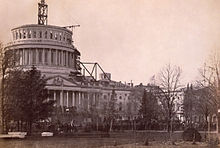37th United States Congress
| 37th United States Congress | |
|---|---|
|
36th ←
→ 38th
|
|

United States Capitol (1861)
|
|
| March 4, 1861 – March 4, 1863 | |
| Senate President | Hannibal Hamlin (R) |
| Senate Pres. pro tem | Solomon Foot (R) |
| House Speaker | Galusha A. Grow (R) |
| Members | 50 Senators 183 Representatives 7 Non-voting members |
| Senate Majority | Republican |
| House Majority | Republican |
| Sessions | |
|
Special: March 4, 1861 – March 28, 1861 1st: July 4, 1861 – August 6, 1861 2nd: December 2, 1861 – July 17, 1862 3rd: December 1, 1862 – March 3, 1863 |
|
The Thirty-seventh United States Congress was a meeting of the legislative branch of the United States federal government, consisting of the United States Senate and the United States House of Representatives. It met in Washington, D.C. from March 4, 1861 to March 4, 1863, during the first two years of Abraham Lincoln's presidency. The apportionment of seats in the House of Representatives was based on the Seventh Census of the United States in 1850. Both chambers had a Republican majority.
The Senate, a continuing body, was called into special session by President Buchanan, meeting in March 4 to March 28, 1861. The border states and Texas were still represented. Shortly after the Senate session adjourned, Fort Sumter was attacked. The immediate results were to draw four additional states "into the confederacy with their more Southern sisters", and Lincoln called Congress into extraordinary session on July 4, 1861. The Senate confirmed calling forth troops and raising money to suppress rebellion as authorized in the Constitution.
Both Houses then duly met July 4, 1861. Seven states which would send representatives held their state elections for Representative over the months of May to June 1861. Members taking their seats had been elected before the secession crisis, during the formation of the Confederate government, and after Fort Sumter.
Once assembled with a quorum in the House, Congress approved Lincoln's war powers innovations as necessary to preserve the Union. Following the July Federal defeat at First Manassas, the Crittenden Resolution asserted the reason for "the present deplorable civil war." It was meant as an address to the nation, especially to the Border States at a time of U.S. military reverses, when the war support in border state populations was virtually the only thing keeping them in the Union.
...
Wikipedia
